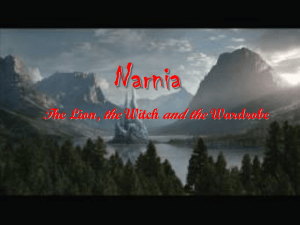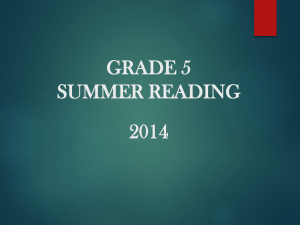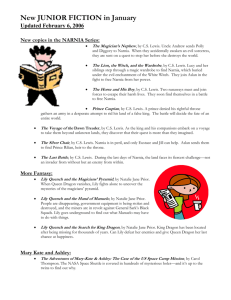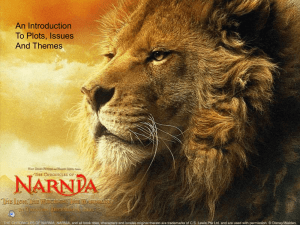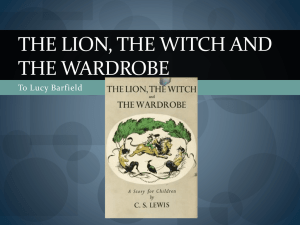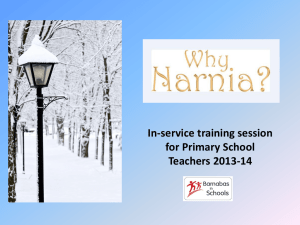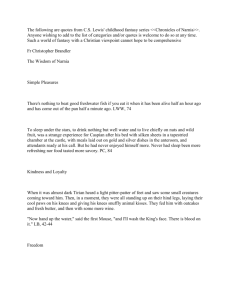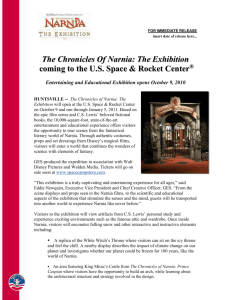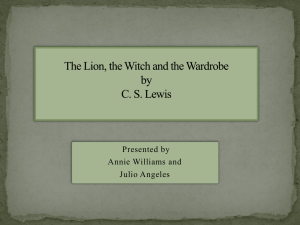HarperCollins Canada
advertisement
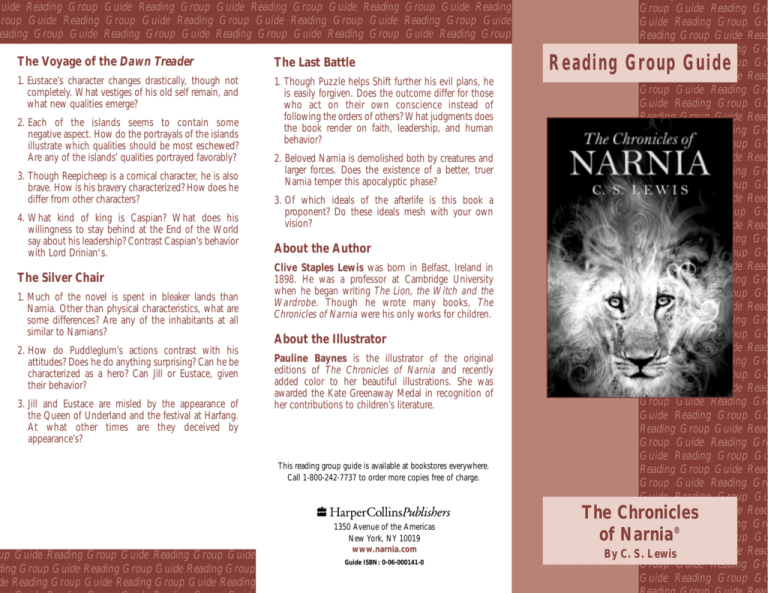
Guide Reading Group Guide Reading Group Guide Reading Group Guide Reading Group Guide Reading Group Guide Reading Group Guide Reading Group Guide Reading Group Guide Reading Group Guide eading Group Guide Reading Group Guide Reading Group Guide Reading Group Guide Reading Group The Voyage of the Dawn Treader The Last Battle 1. Eustace’s character changes drastically, though not completely. What vestiges of his old self remain, and what new qualities emerge? 1. Though Puzzle helps Shift further his evil plans, he is easily forgiven. Does the outcome differ for those who act on their own conscience instead of following the orders of others? What judgments does the book render on faith, leadership, and human behavior? 2. Each of the islands seems to contain some negative aspect. How do the portrayals of the islands illustrate which qualities should be most eschewed? Are any of the islands’ qualities portrayed favorably? 3. Though Reepicheep is a comical character, he is also brave. How is his bravery characterized? How does he differ from other characters? 4. What kind of king is Caspian? What does his willingness to stay behind at the End of the World say about his leadership? Contrast Caspian’s behavior with Lord Drinian's. The Silver Chair 1. Much of the novel is spent in bleaker lands than Narnia. Other than physical characteristics, what are some differences? Are any of the inhabitants at all similar to Narnians? 2. How do Puddleglum’s actions contrast with his attitudes? Does he do anything surprising? Can he be characterized as a hero? Can Jill or Eustace, given their behavior? 3. Jill and Eustace are misled by the appearance of the Queen of Underland and the festival at Harfang. At what other times are they deceived by appearance’s? up Guide Reading Group Guide Reading Group Guide ding Group Guide Reading Group Guide Reading Group de Reading Group Guide Reading Group Guide Reading 2. Beloved Narnia is demolished both by creatures and larger forces. Does the existence of a better, truer Narnia temper this apocalyptic phase? 3. Of which ideals of the afterlife is this book a proponent? Do these ideals mesh with your own vision? About the Author Clive Staples Lewis was born in Belfast, Ireland in 1898. He was a professor at Cambridge University when he began writing The Lion, the Witch and the Wardrobe. Though he wrote many books, The Chronicles of Narnia were his only works for children. About the Illustrator Pauline Baynes is the illustrator of the original editions of The Chronicles of Narnia and recently added color to her beautiful illustrations. She was awarded the Kate Greenaway Medal in recognition of her contributions to children’s literature. This reading group guide is available at bookstores everywhere. Call 1-800-242-7737 to order more copies free of charge. 1350 Avenue of the Americas New York, NY 10019 www.narnia.com Guide ISBN: 0-06-000141-0 Group Guide Reading Gro Guide Reading Group Gu Reading Group Guide Read Group Guide Reading Gro Guide Reading Group Gu Reading Group Guide Read Group Guide Reading Gro Guide Reading Group Gu Reading Group Guide Read Group Guide Reading Gro Guide Reading Group Gu Reading Group Guide Read Group Guide Reading Gro Guide Reading Group Gu Reading Group Guide Read Group Guide Group Gu Reading Group Guide Read Group Guide Reading Gro Guide Reading Group Gu Reading Group Guide Read Group Guide Reading Gro Guide Reading Group Gu Reading Group Guide Read Group Guide Reading Gro Guide Reading Group Gu Reading Group Guide Read Group Guide Reading Gro Guide Reading Group Gu Reading Group Guide Read Group Guide Reading Gro Guide Reading Group Gu Reading Group Guide Read Group Guide Reading Gro Guide Reading Group Gu Reading Group Guide Read Group Guide Reading Gro Guide Reading Group Gu Reading Group Guide Read The Chronicles Group Guide Reading Gro ® of Narnia Guide Reading Group Gu By C. S.Reading Lewis Group Guide Read Group Guide Reading Gro Guide Reading Group Gu Reading Group Guide About The Chronicles of Narnia® The Magician’s Nephew The Horse and His Boy The Lion, the Witch and the Wardrobe was first published in 1950, but C. S. Lewis began piecing together the story long before that. The tales and ancient myths his Irish nurse told always fascinated him, and when he was sixteen, a picture of a faun carrying parcels and an umbrella in the snowy woods popped into his head. Years later, during World War II, four children stayed with Mr. Lewis at his country house and stirred his imagination again. Not long afterward, he began writing the story that would become The Lion, the Witch and the Wardrobe. 1. Many of Narnia’s fantastical creatures are personified; name some of them. Which human qualities are most celebrated? Which are not? 1. At first glance, Bree and Hwin fit into very conservative gender roles. Which of their actions demonstrate a break from these behaviors? How does each of them demonstrate their goodness? What flaws does each possess? While writing, Mr. Lewis incorporated creatures from the myths along with his own memories—like that of the old wardrobe in which he and his brother used to sit. As the children found their way into Narnia, he was still unsure of what his story would be about. Then, the image of Aslan came to him. Mr. Lewis once said, “I don’t know where the Lion came from or why he came. But once he was there, he pulled the whole story together.” After being illustrated by Pauline Baynes, The Lion, the Witch and the Wardrobe was published to great success. With so many stories to tell about Narnia and its unforgettable characters, six more books soon followed. Published in 1956, The Last Battle was awarded the Carnegie Medal—England’s highest honor for children’s literature. Millions of readers have discovered The Chronicles of Narnia. As you read the books for the first time, or rediscover their magic, take some time to discuss them. The following questions are intended to spark debate about topics such as good versus evil, symbolism, and relationships. So gather ’round and journey once more to the wondrous land of Narnia. 2. Elements of fantasy and real life are intermingled in the worlds of Charn and Narnia. What are some characteristics of each world that exemplify this combination? What makes these worlds so different from each other? 3. Although they are children, both Polly and Digory have very distinct personalities. By portraying Polly and Digory the way he did, what message(s) might Lewis have been sending to children about stereotypical and nonstereotypical behavior? 4. Since Uncle Andrew and the Witch are both proponents of magic, ostensibly it is portrayed in a bad light. How is magic celebrated? 2. With a reliance on material goods Lasaraleen provides a sharp contrast to Aravis. What are some of Lasaraleen’s admirable qualities? Do you think Aravis and Susan should be considered strong female role models? Why or why not? 3. Shasta undergoes a metamorphosis of character and identity. How do various factors or characters cause or help him to change? What truths about human nature are revealed in the process? What is Aslan’s role? 4. Loyalty, tolerance, idealism, materialism, and parental roles all play roles in this book. Are these subjects always treated favorably? Do you agree with these treatments? The Lion, the Witch and the WardrobeTM 1. Each of the children undergoes some changes throughout the course of the novel. Discuss how these changes impact their characters. How does sibling interaction shape both them and the plot? 2. Symbolism is quite prevalent in this book. Discuss what Narnia and Aslan symbolize and how their portrayals shape Lewis’s message. Who or what else is symbolic? How? 3. In agreeing to sacrifice himself in Edmund’s place without divulging to the White Witch that he could return, Aslan might be considered somewhat deceitful. What other variances are there on the traditional definitions of good and evil? 4. When Lucy tries to minister to her wounded brother, Aslan hurries her along to tend to others. Does the theme of the greater good vs. the individual arise elsewhere in the story? What other themes arise? Prince Caspian 1. Contrast the Narnia of this story with that over which the children ruled. How does the Narnian passage of time impact the novel? 2. Prince Caspian befriends many Narnian creatures. Which two Old Narnians would you want as royal subjects? Why? 3. What might have been the purpose of including Bacchus in this story? What other mythological or symbolic characters appear? Why? 4. Why is it that Aslan is only visible to Lucy for so long? Does Lucy’s faith in Aslan differ from that of the others? up Guide Reading Group Guide Reading Group Guide Reading Group Guide Reading Group Guide Reading Group Guide Reading Group Guide Reading Group Guide Read up Guide Reading Group Guide Reading Group Guide Reading Group Guide Reading Group Guide Reading Group Guide Reading Group Guide Reading Group Guide Read up Guide Reading Group Guide Reading Group Guide Reading Group Guide Guide Reading Group Guide Reading Group Guide Reading Group Guide Reading Group Guid About The Chronicles of Narnia® The Magician’s Nephew The Horse and His Boy The Lion, the Witch and the Wardrobe was first published in 1950, but C. S. Lewis began piecing together the story long before that. The tales and ancient myths his Irish nurse told always fascinated him, and when he was sixteen, a picture of a faun carrying parcels and an umbrella in the snowy woods popped into his head. Years later, during World War II, four children stayed with Mr. Lewis at his country house and stirred his imagination again. Not long afterward, he began writing the story that would become The Lion, the Witch and the Wardrobe. 1. Many of Narnia’s fantastical creatures are personified; name some of them. Which human qualities are most celebrated? Which are not? 1. At first glance, Bree and Hwin fit into very conservative gender roles. Which of their actions demonstrate a break from these behaviors? How does each of them demonstrate their goodness? What flaws does each possess? While writing, Mr. Lewis incorporated creatures from the myths along with his own memories—like that of the old wardrobe in which he and his brother used to sit. As the children found their way into Narnia, he was still unsure of what his story would be about. Then, the image of Aslan came to him. Mr. Lewis once said, “I don’t know where the Lion came from or why he came. But once he was there, he pulled the whole story together.” After being illustrated by Pauline Baynes, The Lion, the Witch and the Wardrobe was published to great success. With so many stories to tell about Narnia and its unforgettable characters, six more books soon followed. Published in 1956, The Last Battle was awarded the Carnegie Medal—England’s highest honor for children’s literature. Millions of readers have discovered The Chronicles of Narnia. As you read the books for the first time, or rediscover their magic, take some time to discuss them. The following questions are intended to spark debate about topics such as good versus evil, symbolism, and relationships. So gather ’round and journey once more to the wondrous land of Narnia. 2. Elements of fantasy and real life are intermingled in the worlds of Charn and Narnia. What are some characteristics of each world that exemplify this combination? What makes these worlds so different from each other? 3. Although they are children, both Polly and Digory have very distinct personalities. By portraying Polly and Digory the way he did, what message(s) might Lewis have been sending to children about stereotypical and nonstereotypical behavior? 4. Since Uncle Andrew and the Witch are both proponents of magic, ostensibly it is portrayed in a bad light. How is magic celebrated? 2. With a reliance on material goods Lasaraleen provides a sharp contrast to Aravis. What are some of Lasaraleen’s admirable qualities? Do you think Aravis and Susan should be considered strong female role models? Why or why not? 3. Shasta undergoes a metamorphosis of character and identity. How do various factors or characters cause or help him to change? What truths about human nature are revealed in the process? What is Aslan’s role? 4. Loyalty, tolerance, idealism, materialism, and parental roles all play roles in this book. Are these subjects always treated favorably? Do you agree with these treatments? The Lion, the Witch and the WardrobeTM 1. Each of the children undergoes some changes throughout the course of the novel. Discuss how these changes impact their characters. How does sibling interaction shape both them and the plot? 2. Symbolism is quite prevalent in this book. Discuss what Narnia and Aslan symbolize and how their portrayals shape Lewis’s message. Who or what else is symbolic? How? 3. In agreeing to sacrifice himself in Edmund’s place without divulging to the White Witch that he could return, Aslan might be considered somewhat deceitful. What other variances are there on the traditional definitions of good and evil? 4. When Lucy tries to minister to her wounded brother, Aslan hurries her along to tend to others. Does the theme of the greater good vs. the individual arise elsewhere in the story? What other themes arise? Prince Caspian 1. Contrast the Narnia of this story with that over which the children ruled. How does the Narnian passage of time impact the novel? 2. Prince Caspian befriends many Narnian creatures. Which two Old Narnians would you want as royal subjects? Why? 3. What might have been the purpose of including Bacchus in this story? What other mythological or symbolic characters appear? Why? 4. Why is it that Aslan is only visible to Lucy for so long? Does Lucy’s faith in Aslan differ from that of the others? up Guide Reading Group Guide Reading Group Guide Reading Group Guide Reading Group Guide Reading Group Guide Reading Group Guide Reading Group Guide Read up Guide Reading Group Guide Reading Group Guide Reading Group Guide Reading Group Guide Reading Group Guide Reading Group Guide Reading Group Guide Read up Guide Reading Group Guide Reading Group Guide Reading Group Guide Guide Reading Group Guide Reading Group Guide Reading Group Guide Reading Group Guid About The Chronicles of Narnia® The Magician’s Nephew The Horse and His Boy The Lion, the Witch and the Wardrobe was first published in 1950, but C. S. Lewis began piecing together the story long before that. The tales and ancient myths his Irish nurse told always fascinated him, and when he was sixteen, a picture of a faun carrying parcels and an umbrella in the snowy woods popped into his head. Years later, during World War II, four children stayed with Mr. Lewis at his country house and stirred his imagination again. Not long afterward, he began writing the story that would become The Lion, the Witch and the Wardrobe. 1. Many of Narnia’s fantastical creatures are personified; name some of them. Which human qualities are most celebrated? Which are not? 1. At first glance, Bree and Hwin fit into very conservative gender roles. Which of their actions demonstrate a break from these behaviors? How does each of them demonstrate their goodness? What flaws does each possess? While writing, Mr. Lewis incorporated creatures from the myths along with his own memories—like that of the old wardrobe in which he and his brother used to sit. As the children found their way into Narnia, he was still unsure of what his story would be about. Then, the image of Aslan came to him. Mr. Lewis once said, “I don’t know where the Lion came from or why he came. But once he was there, he pulled the whole story together.” After being illustrated by Pauline Baynes, The Lion, the Witch and the Wardrobe was published to great success. With so many stories to tell about Narnia and its unforgettable characters, six more books soon followed. Published in 1956, The Last Battle was awarded the Carnegie Medal—England’s highest honor for children’s literature. Millions of readers have discovered The Chronicles of Narnia. As you read the books for the first time, or rediscover their magic, take some time to discuss them. The following questions are intended to spark debate about topics such as good versus evil, symbolism, and relationships. So gather ’round and journey once more to the wondrous land of Narnia. 2. Elements of fantasy and real life are intermingled in the worlds of Charn and Narnia. What are some characteristics of each world that exemplify this combination? What makes these worlds so different from each other? 3. Although they are children, both Polly and Digory have very distinct personalities. By portraying Polly and Digory the way he did, what message(s) might Lewis have been sending to children about stereotypical and nonstereotypical behavior? 4. Since Uncle Andrew and the Witch are both proponents of magic, ostensibly it is portrayed in a bad light. How is magic celebrated? 2. With a reliance on material goods Lasaraleen provides a sharp contrast to Aravis. What are some of Lasaraleen’s admirable qualities? Do you think Aravis and Susan should be considered strong female role models? Why or why not? 3. Shasta undergoes a metamorphosis of character and identity. How do various factors or characters cause or help him to change? What truths about human nature are revealed in the process? What is Aslan’s role? 4. Loyalty, tolerance, idealism, materialism, and parental roles all play roles in this book. Are these subjects always treated favorably? Do you agree with these treatments? The Lion, the Witch and the WardrobeTM 1. Each of the children undergoes some changes throughout the course of the novel. Discuss how these changes impact their characters. How does sibling interaction shape both them and the plot? 2. Symbolism is quite prevalent in this book. Discuss what Narnia and Aslan symbolize and how their portrayals shape Lewis’s message. Who or what else is symbolic? How? 3. In agreeing to sacrifice himself in Edmund’s place without divulging to the White Witch that he could return, Aslan might be considered somewhat deceitful. What other variances are there on the traditional definitions of good and evil? 4. When Lucy tries to minister to her wounded brother, Aslan hurries her along to tend to others. Does the theme of the greater good vs. the individual arise elsewhere in the story? What other themes arise? Prince Caspian 1. Contrast the Narnia of this story with that over which the children ruled. How does the Narnian passage of time impact the novel? 2. Prince Caspian befriends many Narnian creatures. Which two Old Narnians would you want as royal subjects? Why? 3. What might have been the purpose of including Bacchus in this story? What other mythological or symbolic characters appear? Why? 4. Why is it that Aslan is only visible to Lucy for so long? Does Lucy’s faith in Aslan differ from that of the others? up Guide Reading Group Guide Reading Group Guide Reading Group Guide Reading Group Guide Reading Group Guide Reading Group Guide Reading Group Guide Read up Guide Reading Group Guide Reading Group Guide Reading Group Guide Reading Group Guide Reading Group Guide Reading Group Guide Reading Group Guide Read up Guide Reading Group Guide Reading Group Guide Reading Group Guide Guide Reading Group Guide Reading Group Guide Reading Group Guide Reading Group Guid Guide Reading Group Guide Reading Group Guide Reading Group Guide Reading Group Guide Reading Group Guide Reading Group Guide Reading Group Guide Reading Group Guide Reading Group Guide eading Group Guide Reading Group Guide Reading Group Guide Reading Group Guide Reading Group The Voyage of the Dawn Treader The Last Battle 1. Eustace’s character changes drastically, though not completely. What vestiges of his old self remain, and what new qualities emerge? 1. Though Puzzle helps Shift further his evil plans, he is easily forgiven. Does the outcome differ for those who act on their own conscience instead of following the orders of others? What judgments does the book render on faith, leadership, and human behavior? 2. Each of the islands seems to contain some negative aspect. How do the portrayals of the islands illustrate which qualities should be most eschewed? Are any of the islands’ qualities portrayed favorably? 3. Though Reepicheep is a comical character, he is also brave. How is his bravery characterized? How does he differ from other characters? 4. What kind of king is Caspian? What does his willingness to stay behind at the End of the World say about his leadership? Contrast Caspian’s behavior with Lord Drinian's. The Silver Chair 1. Much of the novel is spent in bleaker lands than Narnia. Other than physical characteristics, what are some differences? Are any of the inhabitants at all similar to Narnians? 2. How do Puddleglum’s actions contrast with his attitudes? Does he do anything surprising? Can he be characterized as a hero? Can Jill or Eustace, given their behavior? 3. Jill and Eustace are misled by the appearance of the Queen of Underland and the festival at Harfang. At what other times are they deceived by appearance’s? up Guide Reading Group Guide Reading Group Guide ding Group Guide Reading Group Guide Reading Group de Reading Group Guide Reading Group Guide Reading 2. Beloved Narnia is demolished both by creatures and larger forces. Does the existence of a better, truer Narnia temper this apocalyptic phase? 3. Of which ideals of the afterlife is this book a proponent? Do these ideals mesh with your own vision? About the Author Clive Staples Lewis was born in Belfast, Ireland in 1898. He was a professor at Cambridge University when he began writing The Lion, the Witch and the Wardrobe. Though he wrote many books, The Chronicles of Narnia were his only works for children. About the Illustrator Pauline Baynes is the illustrator of the original editions of The Chronicles of Narnia and recently added color to her beautiful illustrations. She was awarded the Kate Greenaway Medal in recognition of her contributions to children’s literature. This reading group guide is available at bookstores everywhere. Call 1-800-242-7737 to order more copies free of charge. 1350 Avenue of the Americas New York, NY 10019 www.narnia.com Guide ISBN: 0-06-000141-0 Group Guide Reading Gro Guide Reading Group Gu Reading Group Guide Read Group Guide Reading Gro Guide Reading Group Gu Reading Group Guide Read Group Guide Reading Gro Guide Reading Group Gu Reading Group Guide Read Group Guide Reading Gro Guide Reading Group Gu Reading Group Guide Read Group Guide Reading Gro Guide Reading Group Gu Reading Group Guide Read Group Guide Group Gu Reading Group Guide Read Group Guide Reading Gro Guide Reading Group Gu Reading Group Guide Read Group Guide Reading Gro Guide Reading Group Gu Reading Group Guide Read Group Guide Reading Gro Guide Reading Group Gu Reading Group Guide Read Group Guide Reading Gro Guide Reading Group Gu Reading Group Guide Read Group Guide Reading Gro Guide Reading Group Gu Reading Group Guide Read Group Guide Reading Gro Guide Reading Group Gu Reading Group Guide Read Group Guide Reading Gro Guide Reading Group Gu Reading Group Guide Read The Chronicles Group Guide Reading Gro ® of Narnia Guide Reading Group Gu By C. S.Reading Lewis Group Guide Read Group Guide Reading Gro Guide Reading Group Gu Reading Group Guide Guide Reading Group Guide Reading Group Guide Reading Group Guide Reading Group Guide Reading Group Guide Reading Group Guide Reading Group Guide Reading Group Guide Reading Group Guide eading Group Guide Reading Group Guide Reading Group Guide Reading Group Guide Reading Group The Voyage of the Dawn Treader The Last Battle 1. Eustace’s character changes drastically, though not completely. What vestiges of his old self remain, and what new qualities emerge? 1. Though Puzzle helps Shift further his evil plans, he is easily forgiven. Does the outcome differ for those who act on their own conscience instead of following the orders of others? What judgments does the book render on faith, leadership, and human behavior? 2. Each of the islands seems to contain some negative aspect. How do the portrayals of the islands illustrate which qualities should be most eschewed? Are any of the islands’ qualities portrayed favorably? 3. Though Reepicheep is a comical character, he is also brave. How is his bravery characterized? How does he differ from other characters? 4. What kind of king is Caspian? What does his willingness to stay behind at the End of the World say about his leadership? Contrast Caspian’s behavior with Lord Drinian's. The Silver Chair 1. Much of the novel is spent in bleaker lands than Narnia. Other than physical characteristics, what are some differences? Are any of the inhabitants at all similar to Narnians? 2. How do Puddleglum’s actions contrast with his attitudes? Does he do anything surprising? Can he be characterized as a hero? Can Jill or Eustace, given their behavior? 3. Jill and Eustace are misled by the appearance of the Queen of Underland and the festival at Harfang. At what other times are they deceived by appearance’s? up Guide Reading Group Guide Reading Group Guide ding Group Guide Reading Group Guide Reading Group de Reading Group Guide Reading Group Guide Reading 2. Beloved Narnia is demolished both by creatures and larger forces. Does the existence of a better, truer Narnia temper this apocalyptic phase? 3. Of which ideals of the afterlife is this book a proponent? Do these ideals mesh with your own vision? About the Author Clive Staples Lewis was born in Belfast, Ireland in 1898. He was a professor at Cambridge University when he began writing The Lion, the Witch and the Wardrobe. Though he wrote many books, The Chronicles of Narnia were his only works for children. About the Illustrator Pauline Baynes is the illustrator of the original editions of The Chronicles of Narnia and recently added color to her beautiful illustrations. She was awarded the Kate Greenaway Medal in recognition of her contributions to children’s literature. This reading group guide is available at bookstores everywhere. Call 1-800-242-7737 to order more copies free of charge. 1350 Avenue of the Americas New York, NY 10019 www.narnia.com Guide ISBN: 0-06-000141-0 Group Guide Reading Gro Guide Reading Group Gu Reading Group Guide Read Group Guide Reading Gro Guide Reading Group Gu Reading Group Guide Read Group Guide Reading Gro Guide Reading Group Gu Reading Group Guide Read Group Guide Reading Gro Guide Reading Group Gu Reading Group Guide Read Group Guide Reading Gro Guide Reading Group Gu Reading Group Guide Read Group Guide Group Gu Reading Group Guide Read Group Guide Reading Gro Guide Reading Group Gu Reading Group Guide Read Group Guide Reading Gro Guide Reading Group Gu Reading Group Guide Read Group Guide Reading Gro Guide Reading Group Gu Reading Group Guide Read Group Guide Reading Gro Guide Reading Group Gu Reading Group Guide Read Group Guide Reading Gro Guide Reading Group Gu Reading Group Guide Read Group Guide Reading Gro Guide Reading Group Gu Reading Group Guide Read Group Guide Reading Gro Guide Reading Group Gu Reading Group Guide Read The Chronicles Group Guide Reading Gro ® of Narnia Guide Reading Group Gu By C. S.Reading Lewis Group Guide Read Group Guide Reading Gro Guide Reading Group Gu Reading Group Guide
